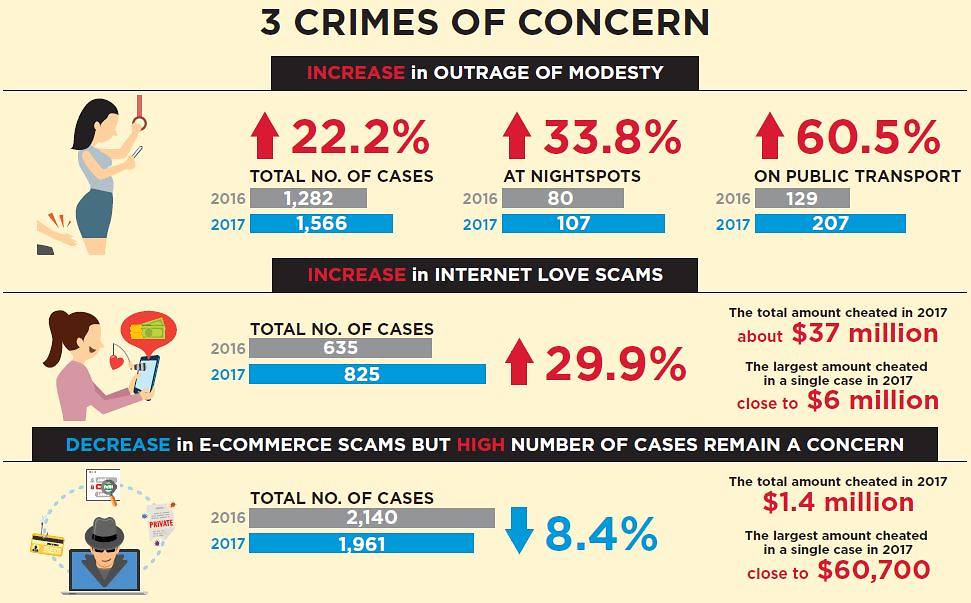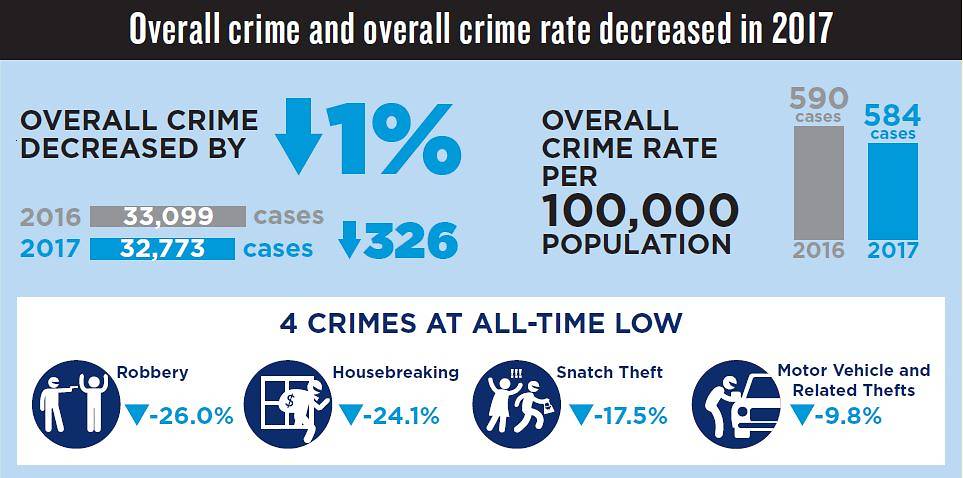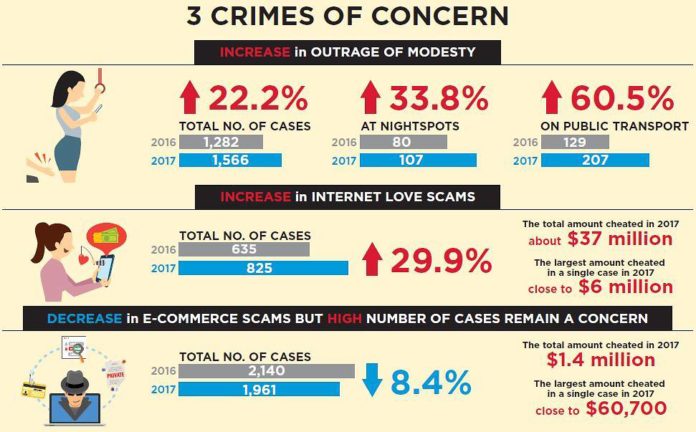SINGAPORE: More cases of molest and Internet love scams were reported last year, even as overall crime in Singapore fell, the Singapore Police Force (SPF) said in its annual crime brief on Saturday (Feb 3).
The number of outrage of modesty cases increased by 22.2 per cent, with 1,566 cases last year compared to 1,282 cases in 2016.
In particular, the number of molest cases on public transport spiked by 60.5 per cent, from 129 cases to 207 cases. Molest cases at entertainment night spots also rose by 33.8 per cent, from 80 cases to 107 cases last year.
SPF said it will step up patrols at public transportation nodes, and also distribute advisories to commuters during the morning and evening peak hours. Outrage of modesty advisory posters have already been placed on the platform screen doors of MRT stations, and public education videos are being screened at bus interchanges and train platforms, it added.
The police have also been working with public entertainment outlets on measures to prevent crimes on their premises, such as the installation of surveillance cameras.
INTERNET LOVE SCAMS RISE; LARGEST AMOUNT CHEATED WAS S$6 MILLION
The number of credit-for-sex scams fell by 46.3 per cent to 418 cases, with the total amount cheated at around S$1 million in 2017, compared to S$1.7 million in 2016.
The number of China officials impersonation scams also decreased, with 186 cases last year, compared to 501 cases in 2016. The total amount cheated fell from S$23.6 million to S$12.5 million.
However, more people fell for Internet love scams, rising 29.9 per cent from 635 cases in 2016 to 825 cases last year. The total amount cheated increased by 54.2 per cent to about S$37 million from S$24 million. The largest amount cheated in a single case was close to S$6 million.
“Internet love scams have been increasing year on year. Many people are still trusting and transferring money to strangers whom they have befriended online,” the police said.
Although e-commerce scams declined by 8.4 per cent, SPF said the high number – 1,961 cases in 2017 – remained a concern. The total amount cheated decreased slightly from S$1.5 million in 2016 to S$1.4 million. The largest amount cheated in a single case last year was close to S$60,700.

Graphic: SPF
SHIFT IN UNLICENSED MONEYLENDING HARASSMENT TACTICS
Following the 10-year low in 2016, the number of unlicensed moneylending-related harassment cases increased by 12.3 per cent to 3,806 cases in 2017, from 3,388 in 2016.
However, there was a significant drop of 21.8 per cent in cases involving damage to property, as more turned to harassing debtors by electronic means, SPF said. Such cases rose by 33.8 per cent to 2,783 cases last year, and formed the majority of unlicensed moneylending-related harassment cases last year.
Victims reported being harassed via SMS and social media platforms, and harassment notes were also placed inside letterboxes, SPF added.
OVERALL CRIME DOWN
Crime in Singapore fell by 1 per cent last year, from 33,099 cases in 2016 to 32,773 cases in 2017. The overall crime rate also improved, with 584 cases per 100,000 people compared to 590 cases in 2016 – a four-year low.

Graphic: SPF
The improvement was largely due to a decrease in violent and serious property crimes, which declined by 12.4 per cent to 218 cases, and theft and related crimes, which fell 4.4 per cent to 13,495 cases last year. Both types of crime fell to an all-time low in 2017.
There were also more crime-free days in Singapore last year. A total of 167 days were free from snatch thefts, housebreakings and robberies – an increase of 31 days from 2016.
“Singapore continues to be one of the safest countries in the world today,” Deputy Commissioner of Police (Investigations and Intelligence) Tan Chye Hee said. But as crimes become increasingly transnational, Singaporeans “must not take our safety and security for granted”, he added.





